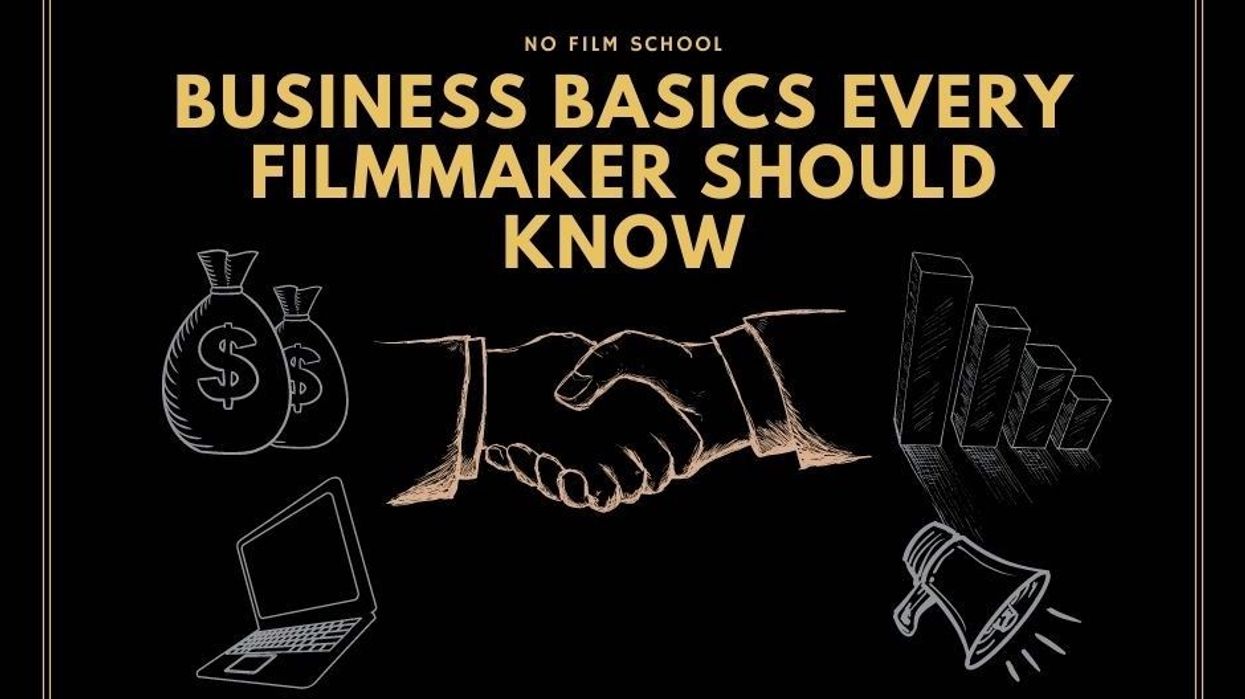Business Basics Every Filmmaker Should Know
Whether we want to or not, we all have to manage some basic business tools to navigate a freelance filmmaking career.

No matter what part of the field you enter, you need to master some business basics for filmmakers. From taxes to invoicing, to strategy... we've got you covered.
Bookmark this page until you memorize it!
Entertainment is regularly called "show business" for a reason: it's half art (show), and half money (business). Understanding some fundamentals of how businesses operate can help you navigate your film career, whether you are just starting out or are mid-career and still struggling with the business half of the industry.
First off, to be clear, this article is mostly focused on the freelance life of a filmmaker at the start of their career. When I was in film school, there was a "film business" class that I sat in on and it was great, but it was about navigating studio mergers and international distribution deals and managing union negotiations. It was all fascinating, but it was pretty high-level stuff, and my career still hasn't gotten to the point where I'm helping negotiate a studio merger.
What I'm focused on here is the ground-level nitty-gritty stuff of dealing with the business part of being a filmmaker that you need to master to get going on your journey making a living telling stories with images.
Let's get into it.
Distorted Market
Before deciding to go for it and work in film, the first thing to accept is that film and media is a very distorted market compared to other jobs you might have worked in. Many, many people compete for every job opportunity. On top of that, there is the idea that what we do is "glamorous" (even if that's just standing in the rain with a walkie talkie managing a parking lot—if it's on a film set, folks think we must be hanging out with stars), and that distorts negotiations.
This means you'll likely find some of the job offers frankly insulting and quite surprising if you worked in another field first. There is a bit of a pricing adjustment for entertainment.
Even folks who get an MFA and get six-figure offers in other fields often have to cut their salary expectation heavily when going to work at a studio. The volume of people trying to get in always affects the math in the basics economics lesson of supply vs. demand. There are so many candidates for every opportunity that it can tend to depress pricing.
The key to navigating this is to not get mad at your competition, but to stay focused on negotiating for more from your clients. Getting annoyed that "all these young folks are coming in and working for too little and it's hurting my rate" is a waste of time and robs you of valuable solidarity. Focus instead on building up such rich webs of relationships, and providing such value for clients, that they have no reason to go hire a 22-year-old straight out of college to do your job for half as much because they are getting so much value from you that it's well worth it.
Also, remember that as your skills develop, you are really bringing something valuable to the table. Even if it's "fun" for you to do it, it's still work, and you should be paid properly for that. Once you develop your skills enough, it will get easier to negotiate with clients for better rates, and those rates are out there.
Cashflow
One of the biggest hurdles to overcome in launching a filmmaking career is the issue of cashflow. If you work a normal job, you get paid every two weeks, and there are even some startups that are hoping to disrupt that and make it possible for workers to get paid at the end of every day. After all, why should you be loaning your boss that money waiting on payday? The film industry, unfortunately, doesn't work like that.
To be clear, the situation we're about to describe isn't how we think things should be, just how they are. We think people should get a check or envelope of cash on set for every day they work. Unfortunately, over time the habit has built up in film that you invoice for your work and get paid between six to nine months later.
Once you are up and going, this isn't as bad, since you get used to it, and you are getting checks from six months earlier that cover today while you wait six months to get paid for the work you are doing now. It sort of smooths itself out. But it's awful when you are just starting out, as you start doing jobs and then aren't paid for them for months at a time while you don't have any "old" money coming in.
The best tricks to avoid this all take time to implement. The first is keeping a large reserve of cash in the bank. If you are thinking of switching over to film, save up as much cash as you can while you get ready to jump. If you are already in film, scrimp and save to build up some cash in the bank. That will help when clients are slow to pay since you'll have a reserve to fall back on.
Then start requiring deposits on work done (50-70% up front) which can help take the sting out of a low payment. You can even offer discounts for early payment.
All of my invoices say 2/10 Net 30 at the bottom. Payment is due in 30 days, but if you pay me in 10 days or less, I'll give you 2% off. Doesn't seem like much, but I've had clients take me up on it before, and it's always great to get paid quickly.
Invoicing
If you are heading out to set or doing a small post job, your client is going to now expect you to send them an invoice for work done. While it's easy to just format up an invoice in Excel, it's a much smarter move to use invoicing software. I personally use WaveApp, since it's free (they make their money off integrated credit card processing), but there are countless others.
The reason why it's good to use an invoice software is that it makes keeping track of who owes you what much easier. Remember how I said some clients might take six to nine months to pay? Well, that means sometimes with small clients, you might forget they owe you money. Someone who owes you tens of thousands of dollars will stay front of mind until they pay, but what about someone you do only a few hours of work for, and they only owe you a few hundred? Will you remember to check your bank statement thoroughly every month until they pay?
That's where a great invoicing software helps. You can look in and see who still owes you money, then go over your bank statements, and if it's paid, mark it paid. If someone has gone long enough without paying, you can even send them a gentle, friendly payment reminder.
For longer jobs, I'll even use the "drafts" feature in Wave to keep track of my hours on a job so it's ready to go and drop as an invoice the minute the job wraps.
Taxes
Most "normal" jobs take the taxes out of your paycheck when you do the work. Most workers remember their disappointment at getting their first paycheck and discovering it's much lower than we thought it would be.
However, most film and motion picture work is different; if you invoiced, generally you end up getting a check for precisely what you invoiced for.
However, you'll still end up owing taxes to the IRS at the end of the year. More than that, whatever you were paid will likely be reported to the IRS, since then your client can write off what they paid to you as a business expense. So you want to be diligent in keeping track of all the money you make so you can properly report it. This is another place where solid invoicing software can help you out.
You might have heard advice such as "actors can write off haircuts and you can write off your cable TV!" That may or may not be true, depending on your local tax laws and how your income is categorized.
My usual advice is to expect to spend about 1% of your income a year on a certified tax professional with expertise and experience in your specific industry. Entertainment always has a lot of regulations and structures and you want to be sure you are doing things correctly. Audits are rare, but they do happen, and considering how many different sources of income you'll have as a filmmaker, it's good to have all your ducks in a row.
Getting Clients
For better or worse, "filmmaking" is largely a freelance industry, so when we're talking about "getting jobs," we're largely talking about finding clients. There are almost no "full-time salary and benefits" jobs for filmmakers in the world. Where they do exist they are in corporate video, which is still fun, but isn't necessarily what everyone is hunting for. So we're assuming you want to make cool stuff for a living, and that means finding clients.
Where do these mysterious clients come from?
Everywhere, but really they come from this awful thing called "networking."
Networking gets a bad wrap because of the folks who teach "power networking" workshops about how to work a room, and sometimes that's useful, but that's not what we mean here. What I mean is "doing a good job on every opportunity you are given," which will inevitably lead to more opportunities. That's the nature of the beast. You do something well for one person, they will recommend you to their friends. You start small, with whatever opportunities you can find (friends of friends, gigs off Craigslist, etc.), and you do a good job, and follow up with everyone you meet politely, and slowly you'll start to grow a career.
The vast majority of clients come that way, through a long series of word-of-mouth coincidences and connections. You can actively go about cold emailing potential clients, and while that does sometimes lead somewhere, it's best to be realistic that it often won't. If you send out 1,000 personally written customized emails targeting clients, and you get two to three responses, you've done well. And none of those responses are likely to lead to any work. That's just how it goes.
Conclusion
That is barely just touching the surface of the business skills that you are going to need to survive and thrive in film, but should be a helpful overview to at least get you started on a career.
You can also check out my book, Business & Entrepreneurship for Filmmakers.
If you enjoyed this and want to see more, let us know in the comments. Are there other areas of film and business you might want to see covered?



















